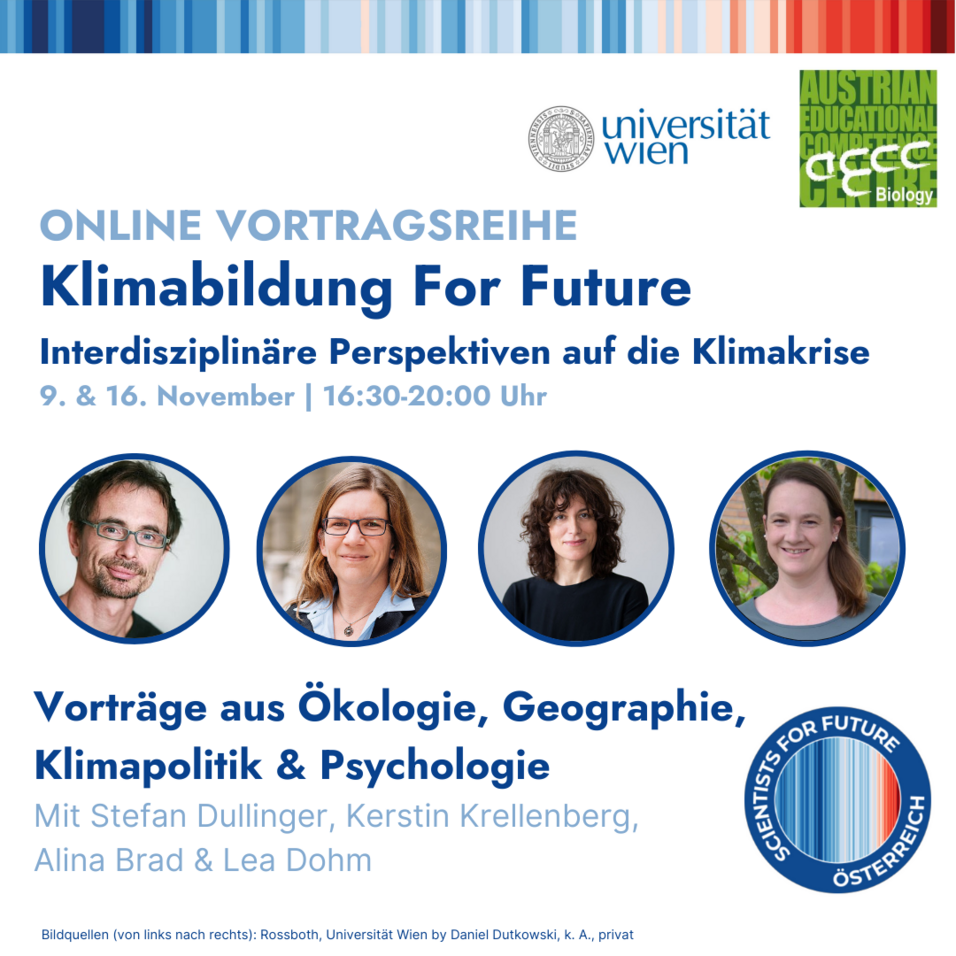Auch dieses Mal konnten wir wieder renommierte Kolleginnen und Kollegen für öffentliche Fachvorträge à 60 min. mit anschließender Diskussion gewinnen.
Dienstag, 9. November, 16:30 - 20:00 Uhr
- Klimawandel und Biodiversität | Stefan Dullinger, Department für Botanik und Biodiversitätsforschung, Univ. Wien
- Hitze, Überschwemmungen und Co. - Klimawandel findet Stadt und statt | Kerstin Krellenberg, Institut für Geographie und Regionalforschung, Univ. Wien
Dienstag, 16. November, 16:30 - 20:00 Uhr
- Klimapolitik: Teil der Lösung oder Teil des Problems? | Alina Brad, Institut für Politikwissenschaft, Univ. Wien
- Vom Denken zum Handeln | Lea Dohm, Psychologists For Future, Deutschland
Anmeldung: Bitte melden Sie sich hier zur Vortragsreihe an. Die Vortragsreihe wird online über eine ZOOM-Videokonferenz organisiert. Sie bekommen am jeweiligen Vortag den Zoom-Link zugeschickt.
Teilnahme mit Schulklassen: Schulklassen können ebenso teilnehmen, jedoch empfehlen wir hier eine entsprechende Vorbereitung im Rahmen des Fachunterrichts. Falls Sie mit Ihrer Schulklasse teilnehmen möchten, bitten wir um eine kurze Mail an veronika.winter@univie.ac.at.
Organisation: Veronika Winter, Agnes Pürstinger, Linda Hämmerle & Andrea Möller (Klimabildungsteam AECC Biologie)
Weitersagen: Wir freuen uns über weitere Bewerbung der Vorträge im Bekanntenkreis oder Studien- /Arbeitsumfeld. Der Flyer oder Link zur Vortragsreihe können gerne als Einladung an Interessierte weitergeschickt werden!
Wir freuen uns, dass unsere Vortragsreihe nun auch mit den Lectures For Future, an welchen österreichweit schon 12 Hochschulen teilnehmen, assoziiert ist. Durch dieses Angebot kann eine breite Öffentlichkeit zahlreiche spannende Vorträge zur Klimakrise besuchen.

